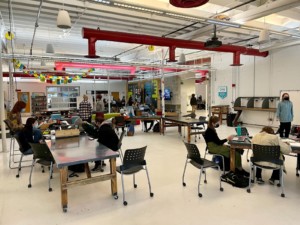Who Will Build the iPhone for Edu?
ASU is hosting an Education Innovation Summit this week. I’ll be moderating a panel exploring next gen learning platforms called “Who Will Build the iPhone for Edu?” Should be a fascinating discussion on one of my favorite subjects.
It feels like we’re approaching a Grand Unifying Vision for next gen learning platforms. The six components include: 1) adaptive content, 2) content management system, 3) learner profile and smart recommendation engine, 4) social learning communities/capabilities, 5) aligned student, teacher, school services, and 6) data warehouse and analytical tools.
Folks in each of these categories think they have a clear path to the grand vision, but big questions remain:
- How will ascendant platforms combine open and proprietary content?
- Who will define the ‘shipping container‘ and tagging standards?
- Will comprehensive virtual and ‘black box’ solutions from K12, Connections Academy, Time to Know and other gain early market share in traditional schools?
- Will the space continue to mature organically from multiple directions or will we see early Big Bang announcements where big players stake out the territory?
- Will winners be device specific (e.g., iPhone ecosystem)?
- Who will organize market demand to promote investment? Will big initiatives track federal assessment grant consortia or will big social learning communities become dominant drivers?
- Will any of these get big/credible enough to develop ‘app store’ energy, enthusiasm, and investment?
- With the explosion of keystroke data, what gets aggregated from class to school to district to state? Where does all this data sit? How will it augment traditional assessment measures?
Wireless Generation’s services around FreeReading.net give us a small early picture of how some of this could play out. But Pearson’s LearningStudio is another approach. Dreambox has an adaptive engine for K-2 math; is that a starting point? Will some of the LMS folks make the leap to adaptive content? Will virtual school operators see enough opportunity to invest in next gen content and market to traditional schools?
Some clarity of vision, but lots of questions about how this plays out. I’ll report back after the Tuesday panel, but in the mean time I’d be happy to take your questions and comments to Scottsdale with me.







0 Comments
Leave a Comment
Your email address will not be published. All fields are required.